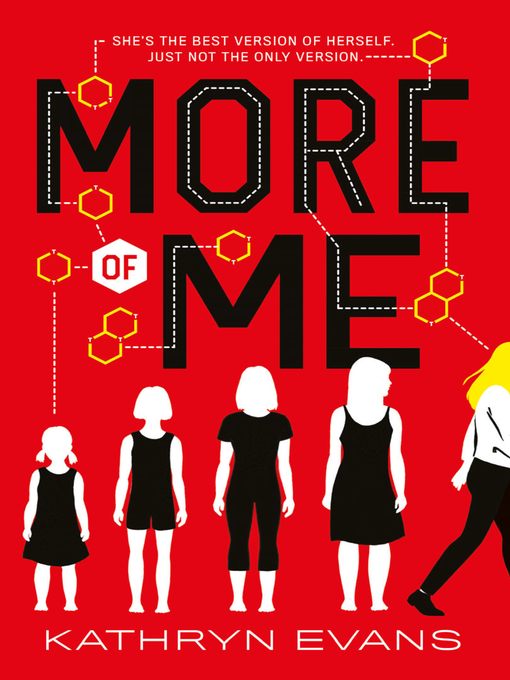
More of Me
فرمت کتاب
ebook
تاریخ انتشار
2017
Lexile Score
620
Reading Level
2-3
نویسنده
Kathryn Evansناشر
ABRAMSشابک
9781683350682
کتاب های مرتبط
- اطلاعات
- نقد و بررسی
- دیدگاه کاربران
نقد و بررسی

May 8, 2017
Almost every year around her birthday, Teva Webb’s cells divide, and an older version of herself emerges, leaving behind a growing trail of dejected younger clones while the new Teva assumes life as usual. In this highly inventive look at the ever-evolving self, Teva’s current 16-year-old incarnation is determined to stop the process; she’s also dodging her doctor-averse mother and her manipulative 15-year-old self, who is demanding to be released to see their boyfriend (the clones are kept hidden at home to protect Teva’s secret). Debut author Evans’s visceral descriptions of the new Teva clawing her way out of the old give the physiologically bizarre premise credibility (“There, next to my bandaged little finger, the ring finger was sporting two nails. Nausea swirled through me”), and the tale serves as an allegory for mental illness while challenging social stigmas and bigotry. At its base, though, it’s a relatable look at growing up, negotiating changes in one’s body and personality, and learning to accept one’s present self and honor one’s past. Teva just has a more literal view of the subject than most. Ages 13–up.

April 1, 2017
Each year, a new version of Teva grows inside her and forces her way out, leaving her discarded self to join their earlier versions; this Teva, 16, won't let that happen. The blonde, blue-eyed, white Tevas live with their single mother. To maintain the fiction that Mom has just one child, only the latest Teva is permitted to leave the house and attend school. The younger girls are docile, but Fifteen is jealous that her successor has appropriated her South Asian best friend, Maddy, and boyfriend, Ollie, and, furious, schemes to reunite with him. Teva's consumed with guilt at the freedom only she has, while fearful of the time when she too will be displaced. Unlike Fifteen, she's drawn not to Ollie but to Tommo, a classmate whom she tutors in English in return for his help in a textiles project. (Both boys are attractive but racially ambiguous, implying a white default.) Teva researches her condition and, to that end, creates a blog under a fake name, to preserve the secrecy her mother insists on. At the same time, she's haunted by a growing fear that her younger versions might not exist outside her own mind. The promising high concept is hampered by slack pacing, an oddly flat emotional tone (more Gossip Girls than Carrie), and cliched, by-the-numbers romance complete with mean girls, college-application angst, and unwarranted focus on the minutiae of high school routine. The book is a British import, and both language and setting have been Americanized. A nifty premise that falls short of its potential. (Science fiction. 13-16)
COPYRIGHT(2017) Kirkus Reviews, ALL RIGHTS RESERVED.

May 1, 2017
Gr 8 Up-Teva is 16 and on the 16th version of herself. Every year, a new and slightly older clone rips out of the previous version. In her house live her younger selves, Twelve, Thirteen, Six, Seven, and Eight. Fifteen was the last one, and she is angry that Teva has taken over her relationship with her boyfriend Ollie and her best friend Maddy. Teva is more than six months from the new iteration, but she is already feeling the new Teva stirring inside. She tries to determine exactly what her genetic abnormality is, find a way to stop it, and keep her teenage social life together. A romantic entanglement arises involving Teva, Fifteen, and Ollie as well as a new love interest. While the plot is engaging and Teva's problem is certainly intriguing, much of the story is wrapped up in the protagonist's social drama instead of in the more sci-fi elements. There are several threads in the narrative, and ultimately it ends satisfactorily. The writing throughout is excellent, and readers will easily be able to take in the story despite the Briticisms. Realistic fiction fans will connect to Teva and will be drawn in enough to want to read the conclusion. VERDICT A solid first purchase for larger collections looking to add a sci-fi tale with realistic fiction elements.-Nancy Jo Lambert, Reedy High School, Frisco, TX
Copyright 2017 School Library Journal, LLC Used with permission.

May 1, 2017
Grades 9-12 Teva has more on her mind than the average 16-year-old. As she explains on her blog, I've got a condition that doesn't even have a name, but eventually, it'll rob me of my future. Imagine all your friends growing up, moving on, and you being stuck in one year of your life. Each year on her birthday, a genetic anomaly causes Teva's cells to painfully split, producing a clone. But only the new clone ages, so all of Teva's previous selves live together, resenting each new year's clone who gets to take over as the acting Teva at school. Fifteen is especially angry and will stop at nothing to get her boyfriend back from the new Teva. Evans' neatly packed narrative is unique among science fictionit is foremost a profound, complex examination of how we relate to our own history. Teva finds accessible truth in the uncanny: we don't need to be defined by our past (or even current) selves, but we can be shaped and changed by them.(Reprinted with permission of Booklist, copyright 2017, American Library Association.)

























دیدگاه کاربران